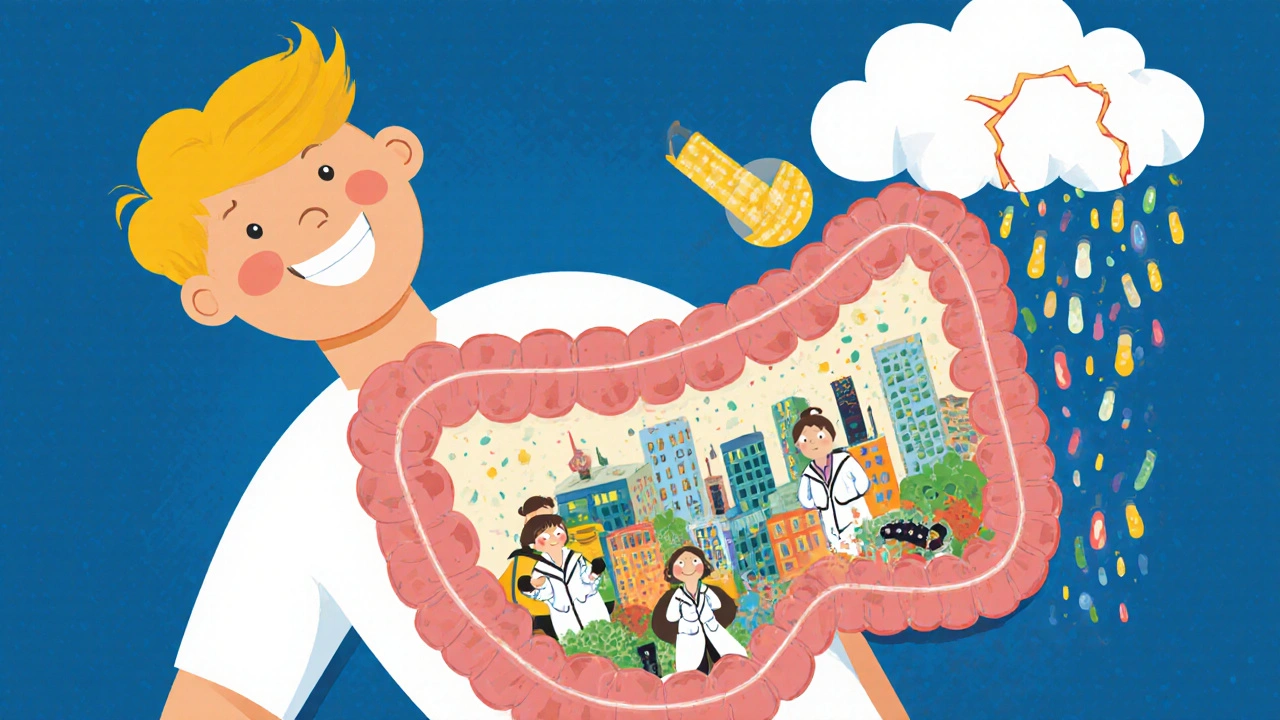When you think about losing weight, you probably think about calories in, calories out. But what if the real story is happening inside your gut? Trillions of microbes live there-bacteria, viruses, fungi-and together they weigh as much as a brick. These aren’t just passengers. They’re active players in how your body stores fat, processes food, and even signals hunger. And when they’re out of balance, they can make weight loss harder-even if you’re eating right and exercising.
What Is Gut Microbiota, and Why Does It Matter for Weight?
Your gut microbiota is the community of trillions of microorganisms living in your digestive tract. They help break down food your body can’t digest on its own, train your immune system, and even produce key chemicals that affect your mood and metabolism. In people with obesity, this community looks different. Studies show a consistent pattern: higher levels of Firmicutes bacteria and lower levels of Bacteroidetes. This shift isn’t just a side effect-it’s linked to how much energy your body pulls from food.
One study found that obese individuals extract 2-10% more calories from the same meal than lean people, thanks to this microbial imbalance. That might not sound like much, but over time, it adds up. Extra calories from fiber that should pass through unused? That’s extra fat stored. And it’s not just about calories. These microbes also weaken the gut lining, letting harmful toxins like lipopolysaccharides (LPS) leak into the bloodstream. That triggers chronic inflammation, which leads directly to insulin resistance-the root of metabolic syndrome and type 2 diabetes.
How Probiotics Might Help Reset Your Gut
Probiotics are live bacteria that, when taken in enough numbers, can help restore balance to your gut. Not all probiotics are the same. Some strains have shown real promise in clinical trials. Lactobacillus gasseri SBT2055 stands out: in a 12-week Japanese trial, participants lost nearly 8% of their visceral fat-the dangerous fat around organs-without changing diet or exercise. Other strains like Lactobacillus rhamnosus GG and Bifidobacterium longum have also shown benefits in reducing body weight and waist size.
A 2025 meta-analysis of 28 studies with over 2,300 participants found that people taking probiotics lost an average of 1.78 kg (about 4 pounds) more than those on placebo. Waist circumference shrank by over 2.5 cm. But here’s the catch: BMI didn’t drop significantly. That tells us probiotics don’t just make you lighter-they improve how your body stores and uses fat. They’re not magic pills, but they do shift the odds.
Synbiotics: When Probiotics Team Up With Prebiotics
Probiotics alone don’t always survive long enough to make a lasting difference. That’s where synbiotics come in-combinations of probiotics and prebiotics (food for good bacteria). Think of it like planting seeds (probiotics) and giving them fertilizer (prebiotics). A 2025 review found synbiotics led to 37% greater weight loss than probiotics alone. Why? Because prebiotics like inulin and FOS help the good bacteria grow, multiply, and stick around longer. They also boost production of short-chain fatty acids (SCFAs), especially butyrate, which strengthens the gut barrier and reduces inflammation. People with obesity often have 15-20% less butyrate. Synbiotics can help fix that.

What the Science Says About Effectiveness
Not every probiotic works for everyone. About 38% of studied strains showed no effect on weight. And even the good ones? Only 45-75% of people respond. Why? Because your gut microbiome is as unique as your fingerprint. A 2024 study found that people in Asian populations saw 22% better results than those in Western countries. That’s likely because their baseline microbiomes differ due to diet, environment, and genetics.
Also, most trials last only 8-12 weeks. And here’s the kicker: 60-80% of the benefits disappear within 8-12 weeks after stopping probiotics. Your gut bacteria bounce back to their old state unless you keep feeding them. That’s why long-term success requires more than a bottle of pills-it needs dietary changes too.
How Probiotics Actually Work in the Body
It’s not just about adding good bugs. Probiotics change how your body functions:
- Strengthen the gut lining: They boost proteins like occludin and claudin-1 by 30-40%, sealing leaks that let toxins in.
- Lower inflammation: Studies show TNF-alpha drops 25-35%, and IL-6 drops 15-25% after probiotic use.
- Improve insulin sensitivity: One trial found HOMA-IR (a marker of insulin resistance) improved by 18.7% after 12 weeks of probiotics and omega-3s.
- Regulate appetite: They increase GLP-1, a hormone that tells your brain you’re full. Some studies show a 20-30% rise in GLP-1 levels.
- Alter bile acid metabolism: This affects how your body absorbs fats and sugars, changing fat storage patterns.
These aren’t theoretical. They’re measurable changes seen in blood tests, tissue samples, and clinical outcomes.
Real-World Results: What You Can Expect
In a 2023 Brazilian study with 11 overweight participants, a six-week probiotic intervention led to an average weight loss of 2.4 kg. That’s about 5.3 pounds. Not dramatic, but meaningful. In another trial, overweight adults taking a high-dose probiotic blend (10 billion CFU/day) with omega-3s saw:
- 12.3% drop in total cholesterol
- 24.5% drop in CRP (a key inflammation marker)
- 18.7% improvement in insulin sensitivity
These aren’t just numbers on a scale. They’re signs your metabolism is healing. And that’s more important than any single pound lost.

Limitations and What’s Still Unknown
There’s a big gap between what we see in labs and what works in real life. Most studies are small-median size is just 60 people. Many last less than 12 weeks. We still don’t know the ideal dose for everyone. Is it 10 billion CFU? 100 billion? Does timing matter? One expert says the time of day you take probiotics might affect results-but no one’s tested it properly yet.
And here’s the toughest part: probiotics don’t fix your diet. If you’re eating processed foods, sugar, and refined carbs, no amount of probiotics will undo that damage. They’re a support tool, not a replacement.
What Should You Do?
If you’re trying to manage weight and suspect gut issues-bloating, irregular digestion, constant cravings-try this:
- Choose a probiotic with Lactobacillus gasseri, Lactobacillus rhamnosus GG, or a multi-strain blend with at least 10 billion CFU per dose.
- Add prebiotic fiber: eat more garlic, onions, leeks, asparagus, oats, and green bananas. Or take a synbiotic supplement.
- Take it daily for at least 12 weeks. Don’t expect quick fixes.
- Pair it with a whole-food diet. Reduce sugar, processed foods, and artificial sweeteners-they feed bad bacteria.
- Track changes: not just weight, but energy, digestion, cravings. Those matter more than the scale.
And remember: if you stop, the benefits fade. This isn’t a one-time fix. It’s a long-term habit.
The Future: Personalized Gut Therapy
Researchers are already testing algorithms that predict which probiotic will work for you based on your microbiome profile. Early pilot studies are 65-75% accurate. In five years, you might get a gut test, get a custom probiotic blend, and see real results. Until then, stick with proven strains, combine them with fiber, and treat your gut like the organ it is-because it’s not just digesting your food. It’s managing your weight, your inflammation, and your metabolism.
Can probiotics help me lose weight without changing my diet?
No. Probiotics alone won’t cause significant weight loss if your diet is high in sugar, processed foods, or refined carbs. They work best when combined with whole foods, fiber, and reduced sugar intake. Think of them as a support system, not a replacement for healthy habits.
Which probiotic strains are best for obesity?
The most studied strains for weight and metabolic health include Lactobacillus gasseri SBT2055 (best for visceral fat), Lactobacillus rhamnosus GG, and Bifidobacterium longum. Multi-strain blends often provide broader benefits. Look for products with at least 10 billion CFU per dose.
How long does it take to see results from probiotics?
Most studies show noticeable changes after 8-12 weeks. Weight loss, waist reduction, and improved blood markers like cholesterol and insulin sensitivity typically appear within this window. Don’t expect results in a week-this is a slow, biological process.
Do I need to take probiotics forever?
If you stop taking them, your gut microbiome usually reverts to its previous state within 8-12 weeks. For lasting results, combine probiotics with long-term dietary changes-like eating more fiber, fermented foods, and less sugar. That way, your good bacteria can thrive even without supplements.
Are there side effects from taking probiotics?
Most people tolerate probiotics well. Some report mild bloating or gas at first, especially with high doses or prebiotics. These usually go away in a few days. People with weakened immune systems or severe illnesses should consult a doctor before starting.
Can I get enough probiotics from yogurt and fermented foods?
Yogurt, kefir, kimchi, and sauerkraut contain beneficial bacteria, but the strains and doses are inconsistent. Most commercial yogurts have too few live cultures to match the doses used in studies (10-100 billion CFU). For targeted metabolic benefits, supplements with verified strains and CFU counts are more reliable.
Why do some studies say probiotics don’t work for weight loss?
Some studies show no effect because they use ineffective strains, low doses, short durations, or populations with type 2 diabetes (which can mask benefits). Also, many studies don’t account for diet or baseline microbiome differences. High-quality trials using the right strains and longer durations consistently show benefits.


Man, this post hit different. I always thought weight loss was just about willpower, but the idea that my gut bacteria could be stealing extra calories from my salad? Wild. I’ve been taking L. gasseri for 3 months now-not much change on the scale, but my bloating’s gone and I don’t crave sugar like I used to. Feels like my body finally stopped fighting me.
Okay but let’s be real-probiotics are just a fancy placebo with a higher price tag. I’ve seen people spend $80 a month on ‘gut health’ supplements while eating McDonald’s for lunch. You want results? Eat less junk. Move more. Stop buying into microbiome marketing. 🤷♂️
So you’re telling me the solution to obesity is… eating more onions? That’s it? The entire $700B weight loss industry built on the idea that we need pills, shakes, and detoxes-and now we’re back to ‘add fiber and chill’? I’m not mad, I’m just… disappointed. Also, 10 billion CFUs? That’s like saying ‘take 10 grains of sand and call it a beach.’
While the mechanistic data on SCFAs and gut barrier integrity is statistically significant in rodent models, the clinical translatability remains questionable due to inter-individual microbiome heterogeneity and confounding dietary variables. Moreover, the majority of human trials exhibit high risk of bias via inadequate blinding and short-term follow-up. Until RCTs with longitudinal metagenomic profiling are conducted, any claims of efficacy remain epistemologically fragile.
USA has the best science. You think Japan’s 8% visceral fat loss is real? Their diet’s basically fish and rice-no wonder they respond better. Over here, people eat pizza and soda and then pop probiotics like candy. That’s not science, that’s delusion. If you want results, stop listening to influencers and start eating steak and eggs. Real food. Not some fermented soy sludge.
Okay but I tried the L. gasseri and lost 3 lbs in 2 weeks 😍 I’m not lying! My jeans are looser and I don’t want cake anymore 🥲🥹 probiotics are magic. also my poop is now a 10/10 🤘
idk if this is real but i took probiotics and my belly stopped bloating so i guess it works? also i started eating bananas and now i poop like a champ 💩😂
I’ve been doing this for 6 months-synbiotic with inulin and L. rhamnosus. Weight didn’t drop much, but my energy’s up, my skin cleared up, and I actually enjoy vegetables now. It’s not about the scale. It’s about feeling like you’re not constantly fighting your own body. Also, I spelled ‘probiotics’ wrong in my first post. Oops.